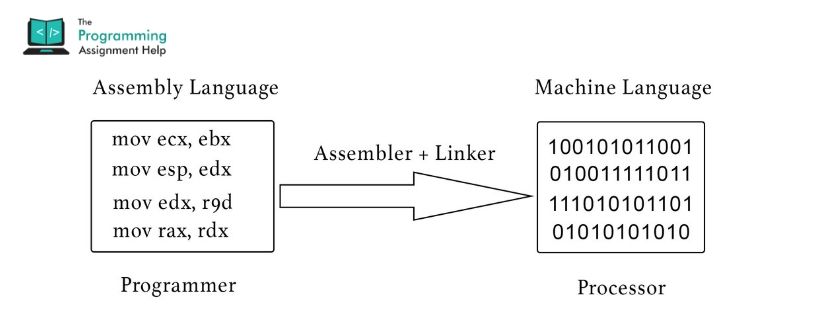Assembly Language Homework Help | Assembly Language Assignment Help
Presenting to you, the assignment services you truly deserve

Order Now
Why Choose The Programming Assignment Help?
On Time Delivery
Plagiarism Free Service
24/7 Support
Affordable Pricing
PhD Holder Experts
100% Confidentiality
I got to learn about your services through my friend. I am glad to find the programming experts like you in writing my programming assignments
Thanks a lot for completing my assembly language assignment without errors and in a short deadline
The code written by your programming experts is error free. I secured top grade in my class. All credit goes to you

Assembly Language Assignment Help Online
Stuck in the middle of complex assembly language coding?
Well, what can be worse than that?
But worry not, our programmers are no less than a powerhouse, capable of creating urgent codes without any plagiarism, errors, or bugs. With our years of experience in providing well-coded programming assignments to students, we have now been considered the best choice for getting assembly language homework help.
They say, “The greatest victory to your goal is when you prove your commitments aren’t just words, they are a forthcoming action.”
And our team of expert programmers proved it
With our commitment to provide:
Expert-programmers guidance
With our team of expert programmers, you can count on our assembly language coding help services. They can assist you with the codes that will be well-executable and easy to understand.
Comprehensive explanations
We understand that assignments aren’t merely a part of your to-do list, but a ladder to academic excellence. Hence, we are sure to provide explanations to nurture merit-worthy understanding in you.
Personalised support by programmers
We address your individual needs, whether it's grasping concepts, debugging functions, or implementing data structures. Our team provides tailored support to deepen your Assembly language understanding.
Timely delivery
Deadlines are the real stress drivers in our academic journey. Taking it as a challenge, we ensure each of your assignments gets submitted on time. Simply. We know how to create excellence with convenience.
Start Your Journey With Us, Now
Assembly Language, a Pioneer in 2024
Assembly language continues to be a foundation for coding enthusiasts and professionals in 2024. This low-level programming language can provide direct control over hardware and is pivotal for optimizing performance and understanding the architecture of the computer.
As technology paces itself up, excelling assembly language remains crucial for developing efficient and powerful software solutions, making it a pioneer in the ever-evolving landscape of programming languages. Having said its stretching scope, it becomes very important to balance your assignments and learning altogether.
However, assignments with urgent deadlines can be proven obstacles for you. As they can hinder you from accomplishing other resolutions. This is where we can be your ally in making your assignments meet the deadlines with absolute ease.
So students, gear up to enjoy the best assembly language assignment writing services in the market and get avail of its endless benefits.
Topics We Covered by our Assembly Language Assignment Help
| Building Blocks | Covers instructions, data types (numbers, alphabets), and the relationship between assembly language and computer memory. |
|---|---|
| Instructions | Includes arithmetic (add, subtract, multiply, divide), logic operations, and data transfer operations. |
| Registers | Small, high-speed storage inside the processor that holds data for operations; managing registers effectively maximizes code speed. |
| Instruction Set Architecture (ISA) | Each processor has its own set of instructions; understanding ISA is crucial for writing correct assembly language code. |
| Assembly Directives | Special commands that control how the assembler translates code into machine code. |
| Addressing Modes | Different ways to reference memory locations for data retrieval. |
Unmissable benefits you can enjoy, with our services
- Quality in an affordable range: Who does not want to get the best quality services without disturbing the budget? The Programming Assignment Help underscores it as a commitment, to providing the best codes at a student-friendly budget.
- Error-free assignment services: Our programmers ensure to hand over precisely crafted codes without any single possibility of students facing frustrating errors and bugs.
- Confidentiality: We did not bind our services till the give and take of assignments but also extended our sincerity in maintaining the privacy of students.
- Revision at ease: We have an assembled team of programmers that ensure each revision is resolved, marking total excellence in academic reviews.
- 24*7 Guidance: With our 24*7 expert guidance and a highly cooperative team of assembly language programmers, you can end your doubt about whom to hire for assembly language homework help.
Challenges In Assembly Language, We Solve For The Students
Complex Assembly Syntax
Assembly language instructions use specific rules and can be proved to be tricky to learn. Even minor errors during the programming can cause problems, making debugging difficult.
Conceptualizing Program Logic
Assembly language programming requires breaking down problems into step-by-step instructions for the computer. This involves data, operations, and memory management, which can be challenging.
Limited Practice Opportunities
Assembly language environments often lack the user-friendly features of higher-level languages, making it harder to practice and debug code.
Hectic Time Constraints
Assembly language exams can be stressful. Tight deadlines and complex concepts like registers and memory management can lead to rushed coding and missed mistakes, impacting your grade.
Frequently Asked Questions
Our Assembly Language assignment help service is crafted to assist you in comprehending and successfully finishing your assignments. Simply submit your Assembly Language tasks, and our seasoned experts will deliver solutions, explanations, and guidance, ensuring you gain a deep understanding of the nuances in low-level programming.
We provide support for a variety of Assembly Language architectures, such as x86, ARM, MIPS, and more. Our team comprises experts with specialized knowledge in diverse architectures, ensuring that your assignments perfectly align with the requirements of your course.
Absolutely! We offer one-on-one tutoring sessions specifically tailored for Assembly Language programming. These sessions provide you with the opportunity to engage directly with our knowledgeable tutors. You can ask questions, seek clarification, and receive personalized guidance, all geared towards enhancing your understanding of Assembly Language concepts.
Ensuring authenticity and originality is our top priority. Our experts meticulously craft Assembly Language solutions from the ground up, guaranteeing the uniqueness of each assignment. A rigorous quality control process, including thorough reviews, is in place to verify the accuracy of the solutions before they are delivered to you. Your satisfaction and the integrity of our work are paramount.
Your personal information and the details of your Assembly Language assignments are kept completely confidential. The Programming Assignment Help takes your privacy seriously and have strong safeguards in place to ensure your data is handled with care and security. Your trust is essential, and we prioritize the protection of your information throughout the entire process.
Yes, our Assembly Language Assignment Help is entirely legitimate. We take pride in delivering genuine assistance to students. Our legitimacy is affirmed by positive feedback from satisfied clients who have experienced the quality of our services. Rest assured, you can trust us for authentic and reliable support in your Assembly Language assignments.
